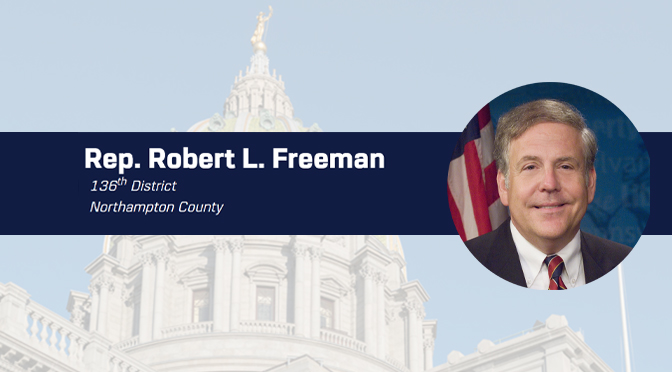HARRISBURG – Legislation that would allow all municipalities, regardless of population size, to establish land banks was approved today by the House Housing and Community Development Committee, according to the bill’s author state Rep. Robert Freeman.
“Expanding access to this transformative resource would revitalize affected neighborhoods and business districts, as well as encourage economic development and improve quality of life in all municipalities, big and small,” said Freeman, D-Northampton.
Land banks are governmental entities that specialize in the conversion of vacant, abandoned and foreclosed properties into productive use.
Current law only allows municipalities with 10,000 residents or more to create landbanks, leaving smaller municipalities without access to resources that are critical for addressing blight. Freeman said that in the 2019-20 session, the General Assembly passed a law that allows municipalities of all population sizes to establish redevelopment authorities.
“It is time we take this same step with land banks,” Freeman said.
Freeman said the Pennsylvania State Association of Boroughs has strongly advocated for the measure.
House Bill 1207 moves to the full state House of Representatives for consideration.
Freeman said he introduced another bill dealing with land banks (H.B. 1206) that would give them environmental liability protection similar to economic development agencies when remediating brownfield sites.
“There are former industrial or commercial sites such as gas stations, dry cleaners, junkyards and former manufacturing facilities throughout the commonwealth where the future use is clouded by environmental concerns. This change in law would allow land banks to own these properties and develop a reuse plan for them without worrying that it would have to take on the liability of enforcement action from the Department of Environmental Protection,” Freeman said. “My bill would save land banks significant time and money in their efforts to create vibrant communities through the reuse of problem properties in our cities and towns.”
Land banks may acquire properties that require remediation as part of the redevelopment effort. As a result of its acquisition, a land bank becomes an owner of a property and, potentially, a “responsible person,” as defined under state law, that may be subject to enforcement action by DEP. Pennsylvania’s brownfields law seeks to encourage responsible parties to voluntarily clean up brownfields sites and offers a broad release of liability to those who meet the regulatory standards.
To incentivize the funding of environmental remediation of brownfields sites, another state law exempts certain entities from liability to DEP, if they do not contribute to or exacerbate contamination at the property. Economic development agencies are exempt from liability under that law and Freeman’s bill would give similar protection to land banks.
House Bill 1206 awaits action by the House Housing and Community Development Committee.
Information provided to TVL by:
Tom Andrews
House Democratic Communications Office


